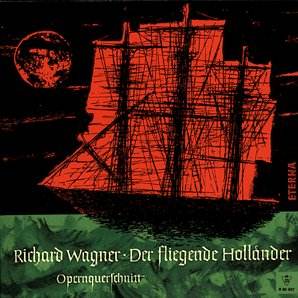The 1960 recording from which these excerpts
are derived, together with the Culshaw/Solti Rheingold of 1958,
set new standards for atmospheric recording of Wagner’s operas.
The original issue on EMI LPs had a wide dynamic range with the
sound warm and clear. So it is on this CD with the orchestral
sound vivid and vibrant and well forward as are the voices. Konwitschny
is slower than Nelsson on his live Bayreuth recording (Philips),
one of my favourites, but he is no slouch. His idiomatic and natural
feel for this music, allowing his singers to phrase with care,
is a significant contribution to the dynamism of the performance.
The overture (tr.1) is well shaped and sets a highly evocative
atmosphere for the whole.
In the eponymous role Fischer-Dieskau, despite
not having the weight of voice for the Dutchman of one’s dreams,
gives a formidable and believable portrayal. He darkens his essentially
soft-grained baritone. This, allied to a smooth legato and a lieder
singer’s way with words, gel to convey the moods and agony of
the Dutchman’s soul. His singing of the ‘monologue’ (tr.3) is
a lesson for all aspiring Wagner baritones in husbanding one’s
resources to best effect. The Daland of Gottlob Frick (born 1906)
is equally well characterized although by this stage in his career
his tone is more lean and biting (tr.7), than sonorous and sappy
in the manner of Talvela for both Klemperer and Solti. The two
tenors are as good as any on disc with Wunderlich’s heady tones
and plangent middle particularly noteworthy (tr.2). Could he have
taken the heavier role of Erik, Senta’s lover, here sung by Rudolf
Schock? Maybe, but I am happy that both parts are well sung and
although Schock’s tone hardens once or twice (tr.9) he is neither
as coarse nor as strained as many recorded rivals. As Senta, Marianne
Schech has questionable moments but her voice is full toned with
a wide dynamic and palette of colour. Her ‘ballad’ (tr.5) is well
shaped and enunciated. The chorus is vibrant and idiomatic and
makes a significant contribution to these recorded excerpts particularly
in tr.7.
The slim booklet has a brief essay on the opera’s
composition and a track-related synopsis in English and German.
The synopsis splits the work into three acts although the track
listing of the scenes and arias indicates this is the single act
version. This is of little importance in excerpts and does not
detract from a very welcome reissue of a vividly recorded and
well sung version of Wagner’s most popular and accessible opera.
Robert J Farr
